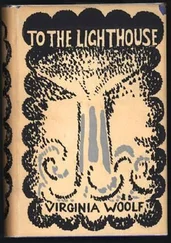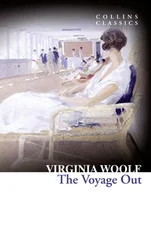Mary, however, left the tea-party rather early, desiring both to be alone, and then to hear some music at the Queen’s Hall. She fully intended to use her loneliness to think out her position with regard to Ralph; but although she walked back to the Strand with this end in view, she found her mind uncomfortably full of different trains of thought. She started one and then another. They seemed even to take their color from the street she happened to be in. Thus the vision of humanity appeared to be in some way connected with Bloomsbury, and faded distinctly by the time she crossed the main road; then a belated organ-grinder in Holborn set her thoughts dancing incongruously; and by the time she was crossing the great misty square of Lincoln’s Inn Fields, she was cold and depressed again, and horribly clear-sighted. The dark removed the stimulus of human companionship, and a tear actually slid down her cheek, accompanying a sudden conviction within her that she loved Ralph, and that he didn’t love her. All dark and empty now was the path where they had walked that morning, and the sparrows silent in the bare trees. But the lights in her own building soon cheered her; all these different states of mind were submerged in the deep flood of desires, thoughts, perceptions, antagonisms, which washed perpetually at the base of her being, to rise into prominence in turn when the conditions of the upper world were favorable. She put off the hour of clear thought until Christmas, saying to herself, as she lit her fire, that it is impossible to think anything out in London; and, no doubt, Ralph wouldn’t come at Christmas, and she would take long walks into the heart of the country, and decide this question and all the others that puzzled her. Meanwhile, she thought, drawing her feet up on to the fender, life was full of complexity; life was a thing one must love to the last fiber of it.
She had sat there for five minutes or so, and her thoughts had had time to grow dim, when there came a ring at her bell. Her eye brightened; she felt immediately convinced that Ralph had come to visit her. Accordingly, she waited a moment before opening the door; she wanted to feel her hands secure upon the reins of all the troublesome emotions which the sight of Ralph would certainly arouse. She composed herself unnecessarily, however, for she had to admit, not Ralph, but Katharine and William Rodney. Her first impression was that they were both extremely well dressed. She felt herself shabby and slovenly beside them, and did not know how she should entertain them, nor could she guess why they had come. She had heard nothing of their engagement. But after the first disappointment, she was pleased, for she felt instantly that Katharine was a personality, and, moreover, she need not now exercise her self-control.
“We were passing and saw a light in your window, so we came up,” Katharine explained, standing and looking very tall and distinguished and rather absent-minded.
“We have been to see some pictures,” said William. “Oh, dear,” he exclaimed, looking about him, “this room reminds me of one of the worst hours in my existence—when I read a paper, and you all sat round and jeered at me. Katharine was the worst. I could feel her gloating over every mistake I made. Miss Datchet was kind. Miss Datchet just made it possible for me to get through, I remember.”
Sitting down, he drew off his light yellow gloves, and began slapping his knees with them. His vitality was pleasant, Mary thought, although he made her laugh. The very look of him was inclined to make her laugh. His rather prominent eyes passed from one young woman to the other, and his lips perpetually formed words which remained unspoken.
“We have been seeing old masters at the Grafton Gallery,” said Katharine, apparently paying no attention to William, and accepting a cigarette which Mary offered her. She leant back in her chair, and the smoke which hung about her face seemed to withdraw her still further from the others.
“Would you believe it, Miss Datchet,” William continued, “Katharine doesn’t like Titian. She doesn’t like apricots, she doesn’t like peaches, she doesn’t like green peas. She likes the Elgin marbles, and gray days without any sun. She’s a typical example of the cold northern nature. I come from Devonshire—”
Had they been quarreling, Mary wondered, and had they, for that reason, sought refuge in her room, or were they engaged, or had Katharine just refused him? She was completely baffled.
Katharine now reappeared from her veil of smoke, knocked the ash from her cigarette into the fireplace, and looked, with an odd expression of solicitude, at the irritable man.
“Perhaps, Mary,” she said tentatively, “you wouldn’t mind giving us some tea? We did try to get some, but the shop was so crowded, and in the next one there was a band playing; and most of the pictures, at any rate, were very dull, whatever you may say, William.” She spoke with a kind of guarded gentleness.
Mary, accordingly, retired to make preparations in the pantry.
“What in the world are they after?” she asked of her own reflection in the little looking-glass which hung there. She was not left to doubt much longer, for, on coming back into the sitting-room with the tea-things, Katharine informed her, apparently having been instructed so to do by William, of their engagement.
“William,” she said, “thinks that perhaps you don’t know. We are going to be married.”
Mary found herself shaking William’s hand, and addressing her congratulations to him, as if Katharine were inaccessible; she had, indeed, taken hold of the tea-kettle.
“Let me see,” Katharine said, “one puts hot water into the cups first, doesn’t one? You have some dodge of your own, haven’t you, William, about making tea?”
Mary was half inclined to suspect that this was said in order to conceal nervousness, but if so, the concealment was unusually perfect. Talk of marriage was dismissed. Katharine might have been seated in her own drawing-room, controlling a situation which presented no sort of difficulty to her trained mind. Rather to her surprise, Mary found herself making conversation with William about old Italian pictures, while Katharine poured out tea, cut cake, kept William’s plate supplied, without joining more than was necessary in the conversation. She seemed to have taken possession of Mary’s room, and to handle the cups as if they belonged to her. But it was done so naturally that it bred no resentment in Mary; on the contrary, she found herself putting her hand on Katharine’s knee, affectionately, for an instant. Was there something maternal in this assumption of control? And thinking of Katharine as one who would soon be married, these maternal airs filled Mary’s mind with a new tenderness, and even with awe. Katharine seemed very much older and more experienced than she was.
Meanwhile Rodney talked. If his appearance was superficially against him, it had the advantage of making his solid merits something of a surprise. He had kept notebooks; he knew a great deal about pictures. He could compare different examples in different galleries, and his authoritative answers to intelligent questions gained not a little, Mary felt, from the smart taps which he dealt, as he delivered them, upon the lumps of coal. She was impressed.
“Your tea, William,” said Katharine gently.
He paused, gulped it down, obediently, and continued.
And then it struck Mary that Katharine, in the shade of her broad-brimmed hat, and in the midst of the smoke, and in the obscurity of her character, was, perhaps, smiling to herself, not altogether in the maternal spirit. What she said was very simple, but her words, even “Your tea, William,” were set down as gently and cautiously and exactly as the feet of a Persian cat stepping among China ornaments. For the second time that day Mary felt herself baffled by something inscrutable in the character of a person to whom she felt herself much attracted. She thought that if she were engaged to Katharine, she, too, would find herself very soon using those fretful questions with which William evidently teased his bride. And yet Katharine’s voice was humble.
Читать дальше












